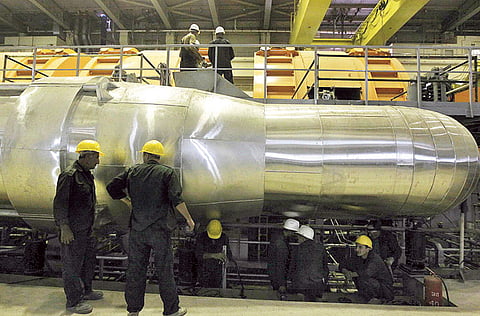Japan quake a wake-up call for region
Concern over potential dangers of Tehran's N-programme

Dubai: The nuclear accident in Japan that followed an earthquake and tsunami earlier this month is a wake-up call for Gulf states that are in close proximity to Iranian nuclear facilities, experts have said.
"The lesson from the Fukushima reactor is a wake-up call for all of us in the region, and we should raise this with the IAEA [International Atomic Energy Agency] in its review of the Iranian nuclear programme next June," said Dr Abdullah Shayji, head of the political science department at Kuwait University.
Related story: Japan to upgrade nuclear safety standards
Kuwaiti politicians have renewed calls for increased safety and confidence-building measures at Iran's nuclear facilities, following the Japan incident, in their meetings with European leaders, Shayji said.
Following the Japan crisis, nuclear projects in several European countries, China, Russia and the United States have come under review, with Germany announcing the temporary shutting down of seven of its 17 reactors.
The UAE's nuclear safety regulator also said it is conducting a "thorough" safety review at the nuclear facilities in Abu Dhabi. In earthquake-prone Iran, however, there has been a muted response for calls on the Islamic Republic to more stringently monitor the safety of its nuclear facilities.
"The debate about the safety of the Bushehr plant unfortunately has not come about inside Iran. What we've seen from Iran is effectively a very defensive position that this plant is top notch safety wise," said Alex Vatanka, a scholar at Washington D.C.'s Middle East Institute.
Lying next to the Gulf's coastal city of Bushehr is the Middle East's first nuclear power plant, expected to be connected to Iran's power grid in the next few months.
Iran's nuclear programme is controversial as it is suspected by the Gulf states and the West to be a front for a weapons programme.
Top concern
Experts say that that allegation has clouded what is a legitimate and more urgent concern: the fallout for regional states following a potential accident at Bushehr.
Bushehr, which sits at the intersection of three tectonic plates, is closer to the capitals of five of the six GCC [Gulf Cooperation Council] states than it is to the Iranian capital Tehran. Kuwait city is 280km away, while Tehran is approximately 750km from Bushehr.
"The GCC states must raise this now or never. There is widespread support and empathy for this concern. It will be amplified as a collective GCC effort," said Shayji, but added that GCC leaders are unlikely to raise this concern.
Such concerns are likely to be perceived by Iran as "an opportune, deliberate and conspiratorial move by the GCC countries" due to the tensions with the GCC over its allegations of Iranian meddling in Arab countries, said Shayji, "but we cannot shy away from them".
Gulf states see a humanitarian and environmental disaster with crippling economic consequences for them should an accident occur at Bushehr.
"Kuwait, Qatar, Bahrain and the UAE rely on desalinated Gulf sea water which streams from the Iran side.
"If it is contaminated, just imagine the economic impact on life on the [Arab] side of the Gulf," said Vatanka. Safety of the Bushehr plant is not a debate the Islamic Republic wants to have, said Vatanka.
Iran is concerned that the issue of safety at its nuclear facilities will give Western powers and the Islamic Republic's Arab adversaries an excuse to pile pressure on it to curb its nuclear programme.
Faults in the area
"But I think deep down it would be a disaster more for the Iranian authorities than anybody else if there is a nuclear radiation crisis in Bushehr," he said.
According to University of Southern California's Professor Mohammad Sahimi, a commentator on Iran's nuclear programme, the faults in the area have caused large earthquakes, but most have been under 7.5 on the Richter scale.
"In other locations, where the rest of Iran's nuclear facilities are, there have not been major earthquakes, but these areas are not too far from where other relatively large earthquakes have occurred," he said.
The International Atomic Energy Agency's (IAEA) International Nuclear Event Scale categorises nuclear accidents between zero and seven, with zero being a "deviation" and seven being a "major accident" with major release of radioactive material with widespread health and environmental effects.
The only disaster to have been qualified as a "major accident" was Ukraine's Chernobyl nuclear disaster in 1986 which resulted in a meltdown that spread radiation as far as northern Europe. Japan's Fukushima incident has been rated on the scale as five, and has not resulted in a meltdown.
The Bushehr reactor is able to resist an earthquake of up to eight on the Richter scale, a magnitude at which an earthquake has not been witnessed in Iran in recent memory, said Sahimi. The reactor is also said to have several protective layers around the core to prevent radiation leaks.
Experts however point out that the Fukushima incident was an indirect consequence of the earthquake, which is believed to have cut off electricity to the reactor leading to a failure in the cooling systems.
The structure of the reactor was however left intact.
Sahimi said the Russian technology used to build the Bushehr reactor is reliable, but expressed concerns about the degree to which the safety standards were enforced, the experience of the management and staff as well as contingency plans should a nuclear accident occur.



